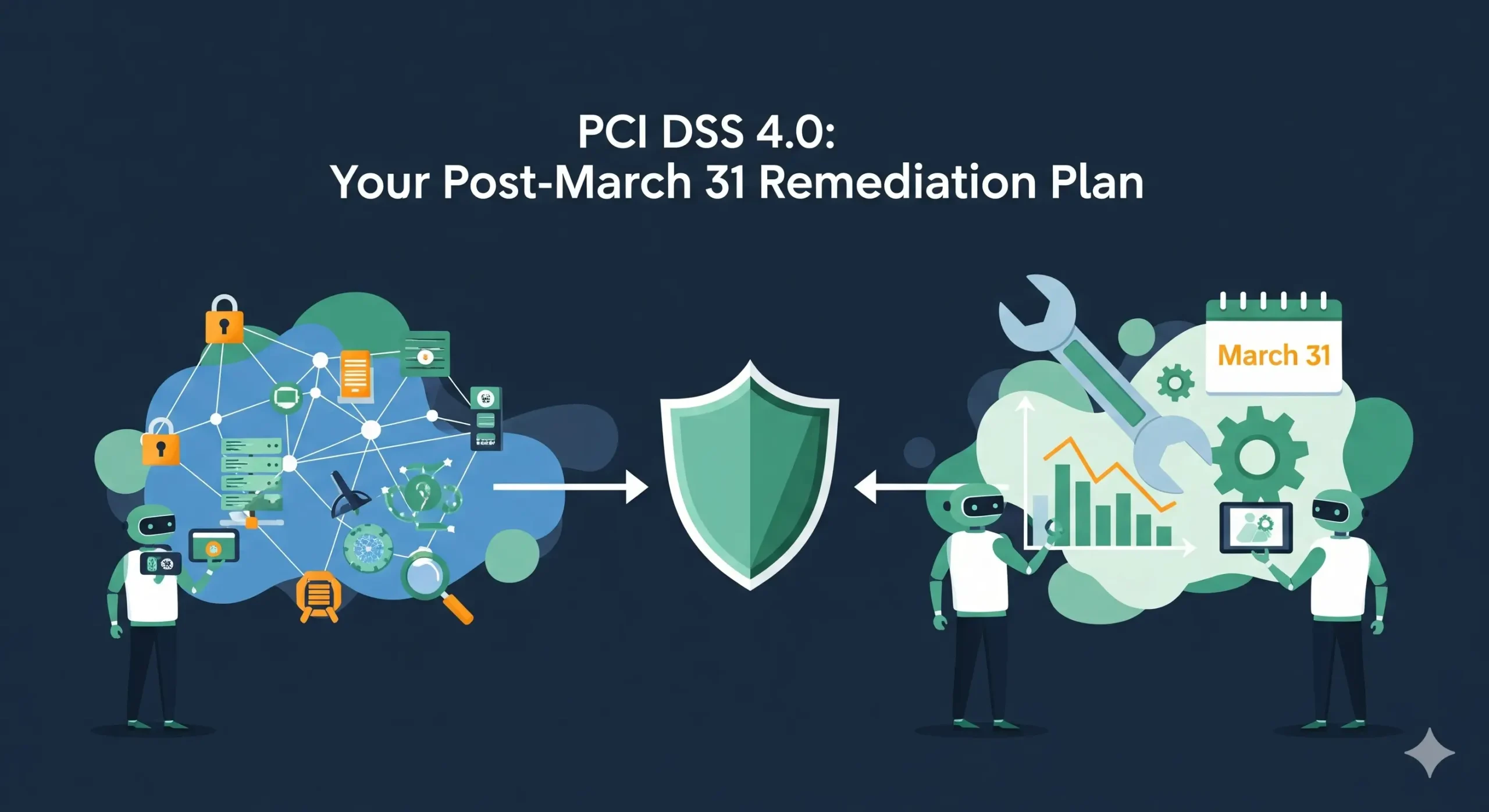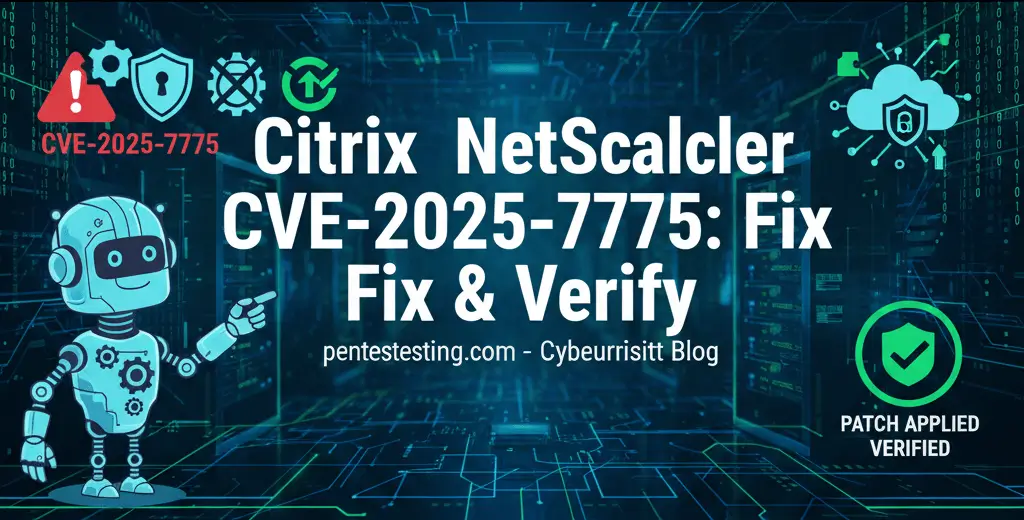Android Security Bulletin October 2025: Fleet Triage
TL;DR (for busy IT & security leads)
- What shipped: The Android Security Bulletin October 2025 publishes two patch levels (2025-10-01 and 2025-10-05) with fixes rolling into AOSP and OEM advisories.
- Your mission: Enforce 2025-10-05 wherever vendor firmware is available. Treat anything below 2025-10-01 as urgent.
- Do now: Inventory
ro.build.version.security_patch, segment high-risk personas (e.g., execs/finance), quarantine stale builds, and tighten sideloading + verify Play Protect until 10-05 coverage is reached.
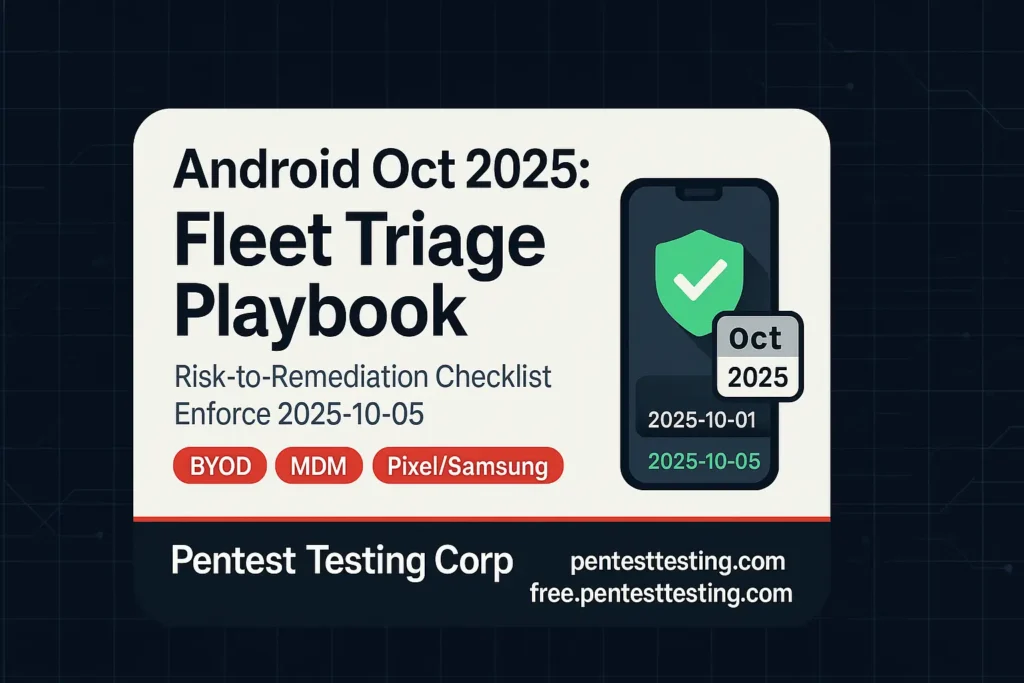
Need a fast, audit-ready plan? Our Risk Assessment Services give you a prioritized gap list; our Remediation Services close them with evidence your auditors will love.
Windows 10 EOS: Risk & Remediation by Oct 14 — cost modeling, scripts, and an audit-ready runbook:
https://www.pentesttesting.com/windows-10-end-of-support-2025/
What shipped this month (and why 2025-10-05 matters)
The Android Security Bulletin October 2025 arrived on October 6, 2025 with two patch strings:
- 2025-10-01 — framework/platform fixes
- 2025-10-05 — includes kernel/SoC/vendor components
Pixels and major OEMs typically align on 2025-10-05 as the “all issues addressed” level. Expect AOSP merges to propagate quickly and OEM security maintenance releases (SMR) (e.g., Samsung’s October bulletin) to follow through carrier/staged rollouts.
Internal note for comms: when notifying stakeholders, always reference the exact string the device displays under Security patch level and include the date (YYYY-MM-DD).
Goal for fleet policy: Minimum 2025-10-05, with exceptions only where an OEM hasn’t published 10-05 yet—then set 2025-10-01 as an interim floor and compensate with fallback controls (below).
Rapid exposure check (30–90 minutes)
1) Inventory patch levels via MDM or ADB
Intune / Microsoft Graph (PowerShell) — pull androidSecurityPatchLevel and flag anything below 2025-10-05:
# Connect to Graph (DeviceManagement)
Connect-MgGraph -Scopes "Device.Read.All","DeviceManagementManagedDevices.Read.All"
Select-MgProfile -Name "v1.0"
$devices = Get-MgDeviceManagementManagedDevice -All `
| Where-Object {$_.OperatingSystem -eq "Android"}
$target = [datetime]"2025-10-05"
$stale = foreach ($d in $devices) {
if ($d.androidSecurityPatchLevel) {
$dp = [datetime]$d.androidSecurityPatchLevel
if ($dp -lt $target) { $d }
}
}
$stale | Select-Object deviceName, userDisplayName, androidSecurityPatchLevel, complianceState |
Format-Table -AutoSizeADB spot-check (lab or kiosk devices)
# Single device
adb shell getprop ro.build.version.security_patch
# Many devices listed in devices.txt (one serial per line)
while read -r serial; do
lvl=$(adb -s "$serial" shell getprop ro.build.version.security_patch | tr -d '\r')
printf "%-20s %s\n" "$serial" "$lvl"
done < devices.txt | sortWorkspace ONE / other MDMs — export Android device inventory including the patch string and compare to 2025-10-05 (see Python comparator below).
2) Map high-risk personas & apps
Prioritize executives, finance, approvals/expenses, banking, and privileged IT profiles. Join device data with HR/role metadata:
-- devices(device_id, user_principal_name, patch_level)
-- personas(upn, risk_tier) -- risk_tier: 'high','medium','low'
SELECT d.device_id, d.user_principal_name, d.patch_level, p.risk_tier
FROM devices d
LEFT JOIN personas p ON p.upn = d.user_principal_name
WHERE (p.risk_tier = 'high' OR d.patch_level < '2025-10-01')
ORDER BY p.risk_tier DESC, d.patch_level ASC;3) Quarantine stale builds (policy tags / groups)
- Move sub-2025-10-01 devices into a Restricted group: limited corporate app access, no sensitive scopes.
- Require Company Portal / DPC check-in and block corporate data sync until updated.
- For COBO/COPE, use kiosk/managed Play until remediated.
Free Website Vulnerability Scanner — screenshot of the tool homepage in action
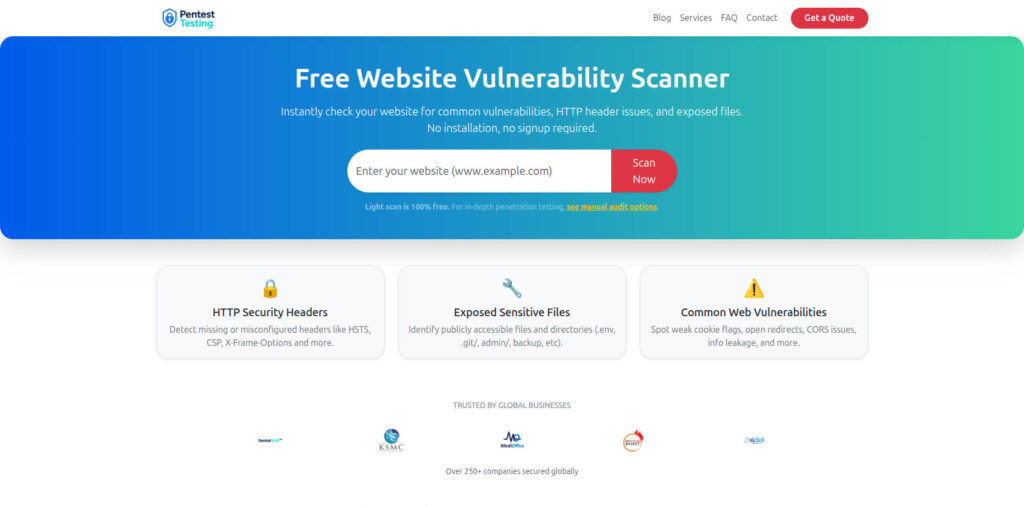
Enforce & verify (target 2025-10-05 minimum)
Intune compliance: set the minimum security patch level
- Create/Update your Android Enterprise compliance policy:
Minimum security patch level =2025-10-05 - Add Play Integrity/Device integrity and root detection.
- Set Actions for noncompliance: mark device noncompliant immediately, block access via Conditional Access after a short grace (e.g., 24–48h).
Graph API example (beta) — set min patch level for device owner
PATCH https://graph.microsoft.com/beta/deviceManagement/deviceCompliancePolicies/{policyId}
Content-Type: application/json
{
"@odata.type": "#microsoft.graph.androidDeviceOwnerCompliancePolicy",
"minAndroidSecurityPatchLevel": "2025-10-05",
"securityRequireSafetyNetAttestationBasicIntegrity": true,
"securityRequireSafetyNetAttestationCertifiedDevice": true
}Validate on-device (field verification)
- On Android: Settings → Security & privacy → Updates → Security patch level.
- Compare to your minimum; anything not
2025-10-05stays in quarantine. - Spot-check OEM notes for your top device families (e.g., Samsung October SMR) to ensure model coverage before closing incidents.
Fallback controls (until your fleet reaches the target)
When vendor firmware isn’t available the same week:
- Tighten sideloading
- Enforce “block unknown sources” and restrict REQUEST_INSTALL_PACKAGES for untrusted apps in EMM where supported.
- Limit Managed Google Play to your approved app set (no consumer storefront browsing).
- Verify Google Play Protect is active
- Enable “Verify apps”/Play Protect via policy; require weekly device health attestation.
- Restrict high-risk intents & data flow
- Block screen capture, disallow USB file transfer, and require network-only backups.
- For high-risk personas, move to work-profile-only app access until 10-05 is installed.
Android Management API (policy skeleton)
{
"name": "policies/fleet-oct-2025",
"ensureVerifyAppsEnabled": true,
"installAppsDisabled": false,
"playStoreMode": "WHITELIST",
"statusReportingSettings": {
"applicationReportsEnabled": true,
"securityPostureEnabled": true,
"systemPropertiesEnabled": ["SECURITY_PATCH_LEVEL"]
},
"usbFileTransferDisabled": true,
"screenCaptureDisabled": true,
"systemUpdate": { "type": "AUTOMATIC" }
}Tip: If a subset is stuck on 2025-09-01, require work profile only, block personal profile access to corp data, and set an expire window (e.g., 7 days) after which the device loses corp access.
Real-time scripts you can run today
Python comparator (works with any CSV from MDM)
import csv, datetime, sys
TARGET = datetime.date.fromisoformat("2025-10-05")
with open("android_fleet.csv", newline="") as f:
r = csv.DictReader(f)
stale, ok = [], []
for row in r:
try:
lvl = datetime.date.fromisoformat(row["androidSecurityPatchLevel"])
except Exception:
lvl = None
(stale if (not lvl or lvl < TARGET) else ok).append({
"deviceName": row.get("deviceName"),
"user": row.get("userPrincipalName"),
"patch": row.get("androidSecurityPatchLevel")
})
print("# STALE (< 2025-10-05)")
for s in sorted(stale, key=lambda x: (x["patch"] or "0000-00-00", x["deviceName"] or "")):
print(f'{s["deviceName"]:<28} {s["user"]:<30} {s["patch"]}')
print("\n# OK (>= 2025-10-05):", len(ok))jq one-liner for JSON exports
jq -r '
.value[]
| {name, upn: .userDisplayName, lvl: .androidSecurityPatchLevel}
| select(.lvl == null or .lvl < "2025-10-05")
| "\(.name)\t\(.upn)\t\(.lvl)"
' devices.json | column -tBlock installs from unknown sources (per-app) via ADB policy
(For fully managed/kiosk test devices; production should use EMM policy.)
# Deny REQUEST_INSTALL_PACKAGES to a sideloading helper app
pkg=com.example.fileshare
adb shell appops set "$pkg" REQUEST_INSTALL_PACKAGES ignoreRollout plan you can paste into your change ticket
- Day 0 (Oct 6–7): Publish advisory to Slack/Teams; update Intune compliance (min =
2025-10-05); create Restricted group & Conditional Access block. - Day 1–2: OEM spot-check (top 5 device families), expand Managed Play allowlist, enable Play Protect enforcement, quarantine <
2025-10-01. - Day 3–5: Re-check compliance dashboard, chase stragglers; for devices without OEM 10-05, hold at
2025-10-01with fallback controls. - Day 6+: Close incident; attach evidence bundle (policy exports, screenshots, remediation notes).
Short on time? We can run the full cycle—assessment, policy updates, and remediation artifacts—via Remediation Services.
Sample Vulnerability Report — redacted PDF export from the tool to check Website Vulnerability
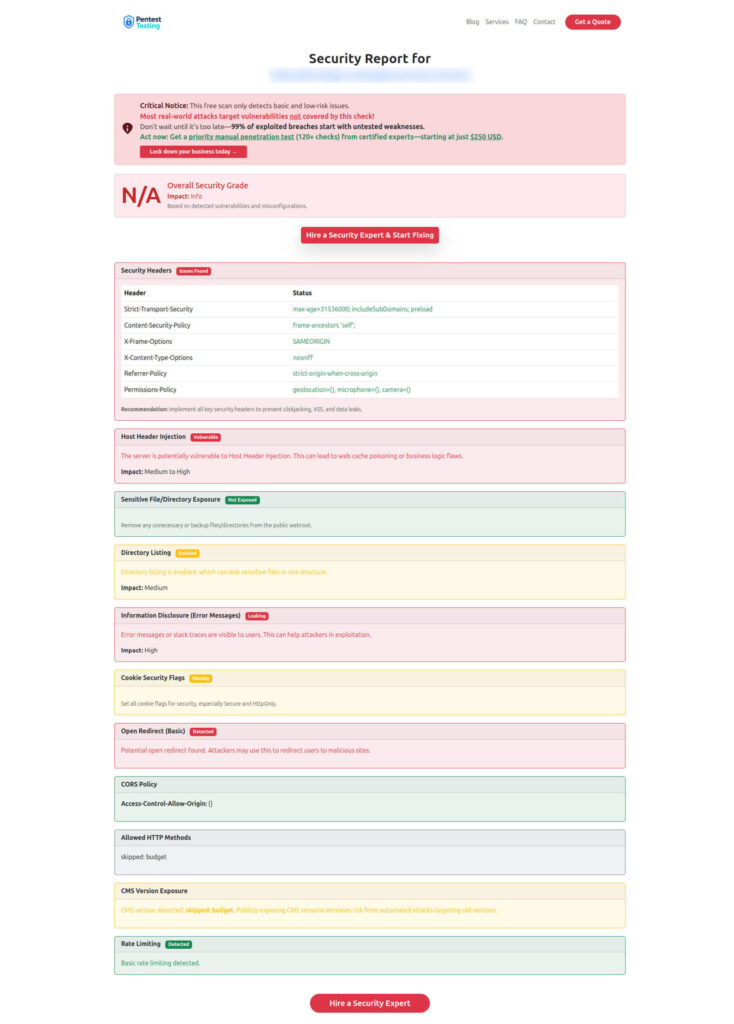
While this playbook is about Android Security Bulletin October 2025, many teams discover risky web endpoints during triage. Use our free scanner to quickly spot web-app exposures tied to your mobile backends and portals: free.pentesttesting.com.
Related Pentest Testing services (help, fast)
- Risk Assessment Services: audit-ready gap analysis + prioritized roadmap.
- Remediation Services: hands-on fixes with artifacts mapped to ISO 27001, SOC 2, PCI DSS, HIPAA.
- Explore our Homepage and Blog for deeper guides.
Recent posts you might share with this update
- CISA KEV Adds CVE-2025-5086: What You Must Do
- Prevent MITM Attack in WordPress with 7 Proven Tips
- Directory Traversal Attack in WordPress: 7 Proven Fixes
- AI App Security Audit: 7 VAPT Reveals & Fixes Critical Risks
Copy-paste policy snippets (bonus)
Intune compliance JSON (conceptual) — Work Profile / DO
{
"@odata.type": "#microsoft.graph.androidWorkProfileCompliancePolicy",
"minAndroidSecurityPatchLevel": "2025-10-05",
"securityRequireGooglePlayServices": true,
"securityRequireSafetyNetAttestationBasicIntegrity": true,
"securityRequireSafetyNetAttestationCertifiedDevice": true
}GitHub Actions — nightly fleet check (calls your inventory API and posts to Slack)
name: Android Patch Watch
on:
schedule: [{ cron: "30 0 * * *" }]
workflow_dispatch:
jobs:
check:
runs-on: ubuntu-latest
steps:
- uses: actions/checkout@v4
- uses: actions/setup-python@v5
- run: pip install requests slack_sdk
- env:
API_URL: ${{ secrets.FLEET_API }}
SLACK_TOKEN: ${{ secrets.SLACK_BOT_TOKEN }}
run: |
python scripts/check_android_patch.py --target 2025-10-05Final call to action
If you want this Android Security Bulletin October 2025 rollout done and evidenced in days, bring us in:
- Risk Assessment Services → gaps, priorities, roadmap
- Remediation Services → fixes, artifacts, audit-ready outcomes
- Quick web checks while you triage: free.pentesttesting.com
🔐 Frequently Asked Questions (FAQs)
Find answers to commonly asked questions about Android Security Bulletin October 2025.
